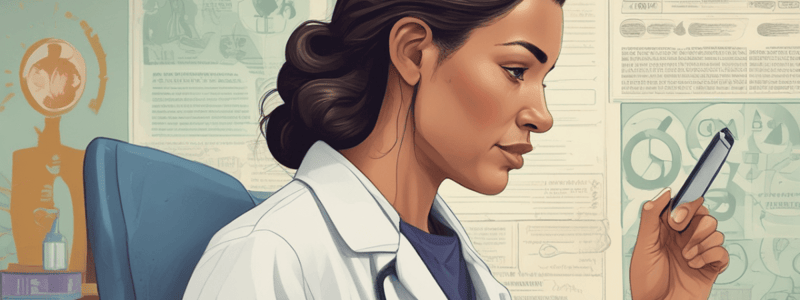Podcast
Questions and Answers
What should the government consider when making policies?
What should the government consider when making policies?
- Economic growth
- Cultural traditions
- Technological advancements
- Public health (correct)
What is one role of schools and communities in health promotion?
What is one role of schools and communities in health promotion?
- Teaching health literacy (correct)
- Distributing health products
- Monitoring pollution levels
- Funding health research
What should institutions and organizations do to promote public health?
What should institutions and organizations do to promote public health?
- Provide medical treatments directly
- Engage in public health promotion and change (correct)
- Limit health education to formal settings
- Focus only on individual health rather than public health
How should schools and communities support a healthy environment?
How should schools and communities support a healthy environment?
What is a practical way to promote health locally?
What is a practical way to promote health locally?
In the context of public health, what responsibility do organizations have?
In the context of public health, what responsibility do organizations have?
What is health literacy?
What is health literacy?
Which of the following is NOT an indicator of a reliable online source of health information?
Which of the following is NOT an indicator of a reliable online source of health information?
Why is lifelong learning important in health?
Why is lifelong learning important in health?
What is a harmful consequence of health fraud?
What is a harmful consequence of health fraud?
Flashcards are hidden until you start studying
Study Notes
Locating Health Information
- Reliable sources of health information include government agencies, educational institutions, and non-profit organizations with URLs ending in .gov, .edu, and .org.
- Websites with URLs ending in .net or .com are less likely to contain reliable health information.
- When searching online, start with general sources and evaluate the credibility of websites using the following criteria:
- Check if the author is an expert in the field.
- Determine the sponsor's goal in creating the website.
- Verify that all links lead to active websites.
- Check the website's creation and update dates.
Evaluating Health Information
- Newspapers and magazines are not reliable sources of health information due to potential biases and conflicts of interest.
- Ask a librarian or a healthcare professional for help in evaluating sources.
- When evaluating health information, consider the following:
- Is the source reliable?
- Is the information current?
- Is the information applicable to your life stage and situation?
- Does the source have a bias?
- Does the source refer to research published by medical scientists?
Pseudoscience vs Science
- Pseudoscience is a theory or health claim that is not supported by scientific evidence and is not peer-reviewed.
- Characteristics of pseudoscience include claims that are too good to be true, lack of scientific evidence, and biased or misleading information.
Applying Health Information
- Applying health information requires active attention to your health and wellness.
- Ignoring health information can lead to negative consequences, such as poor nutrition or injury.
Health Products and Services
- A consumer is someone who purchases goods and services.
- Informed consumers have the knowledge and skills to make good decisions about health products and services.
- When choosing a health product, consider the following:
- Be prepared and know the health issue you want to address.
- Research and learn about your options before shopping.
- Make sure the product is intended for your health issue.
- Check the label for active ingredients and warnings.
Health Fraud
- Health fraud is illegal activity related to health products and services.
- Examples of health fraud include products that claim to treat, diagnose, or cure diseases without scientific evidence, fake medical devices, and misleading or deceptive advertisements.
Communicating Health Information
- Advocating for the health of your family and community involves sharing reliable health information with others.
- Health promotion involves supporting the health of your family and community.
Resources and Accessing Health Services
- Reliable health resources include the US Department of Agriculture's MyPlate website and the Supplemental Nutrition Assistance Program (SNAP).
- Accessing health services involves determining your health needs, researching alternatives, comparing services, and deciding which health service best meets your needs.
Health Promotion
- Health promotion involves advocating for the health of your family and community.
- Examples of health promotion include encouraging a family member to quit smoking, researching health risks, and presenting information to support their decision.
- Health promotion can also apply beyond your local community, involving institutions, organizations, and governments in promoting health.
Studying That Suits You
Use AI to generate personalized quizzes and flashcards to suit your learning preferences.




